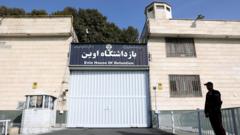Tensions heighten as missile exchanges continue between the U.S., Israel, and Iran, casting doubts on the proposed peace accord.
**Trump Declares Cease-Fire Amidst Ongoing Conflict Between Israel and Iran**

**Trump Declares Cease-Fire Amidst Ongoing Conflict Between Israel and Iran**
A rapidly evolving situation as President Trump announces a cease-fire, while Iran contradicts the claim.
In a dramatic escalation of conflict between Israel and Iran, President Trump announced on social media that a cease-fire was imminent after more than a week of missile exchanges between the two nations. This declaration arose shortly after an Iranian missile strike on Al Udeid Air Base in Qatar, which serves as the largest American military installation in the Middle East. The backdrop further complicated the scenario as U.S. forces conducted airstrikes targeting Iranian nuclear sites earlier in the week.
The situation took a sudden twist when Iran's foreign minister publicly denied the existence of any cease-fire agreement, emphasizing there would be no cessation of hostilities unless Israel halted its military operations against Iran. The Iranian minister's remarks surfaced following Trump's assurances that both parties would agree to a cessation of military actions with phased implementation measures.
As military exchanges continued, Israeli forces intensified their operations within Iran, launching numerous missile strikes in a manner that overshadowed Trump's claims of a truce. With the deadline set by Iran's foreign minister fast approaching, Israeli officials remained tight-lipped while their military actions raised questions about the viability of the proposed cease-fire.
Vice President JD Vance highlighted the potential for peace following Trump's announcement, suggesting that the war in the region might be coming to an end. However, uncertainty loomed as Israel's military conduct appeared inconsistent with the intended peace process, indicating deep skepticism about whether a halt in fighting could be achieved.
In the hours following Trump's declaration, a flurry of missile activity was observed as Iran retaliated against U.S. positions amidst growing fears of escalating hostilities. Furthermore, Qatar, acting as a mediator, was reported to be engaged with both parties in an effort to preserve regional stability.
Global economic implications of the conflict became apparent, with oil prices fluctuating in response to the violence and fears regarding the stability of transport routes through the Strait of Hormuz. Urgent calls for a diplomatic path forward emerged, particularly from European officials who warned that the ongoing conflict had the potential to spiral into broader violence.
The International Atomic Energy Agency's director made a public appeal for an immediate return to negotiations, hinting at a potential diplomatic route amidst escalating hostilities. Meanwhile, U.S. legislators expressed frustration, citing concerns over an apparent lack of military authorization in the decisions made by the Trump administration.
As the two nations prepared to confront the outcomes of recent events, the region remained on edge, seeking clarity and resolution amid the chaos of ongoing military engagements.
The situation took a sudden twist when Iran's foreign minister publicly denied the existence of any cease-fire agreement, emphasizing there would be no cessation of hostilities unless Israel halted its military operations against Iran. The Iranian minister's remarks surfaced following Trump's assurances that both parties would agree to a cessation of military actions with phased implementation measures.
As military exchanges continued, Israeli forces intensified their operations within Iran, launching numerous missile strikes in a manner that overshadowed Trump's claims of a truce. With the deadline set by Iran's foreign minister fast approaching, Israeli officials remained tight-lipped while their military actions raised questions about the viability of the proposed cease-fire.
Vice President JD Vance highlighted the potential for peace following Trump's announcement, suggesting that the war in the region might be coming to an end. However, uncertainty loomed as Israel's military conduct appeared inconsistent with the intended peace process, indicating deep skepticism about whether a halt in fighting could be achieved.
In the hours following Trump's declaration, a flurry of missile activity was observed as Iran retaliated against U.S. positions amidst growing fears of escalating hostilities. Furthermore, Qatar, acting as a mediator, was reported to be engaged with both parties in an effort to preserve regional stability.
Global economic implications of the conflict became apparent, with oil prices fluctuating in response to the violence and fears regarding the stability of transport routes through the Strait of Hormuz. Urgent calls for a diplomatic path forward emerged, particularly from European officials who warned that the ongoing conflict had the potential to spiral into broader violence.
The International Atomic Energy Agency's director made a public appeal for an immediate return to negotiations, hinting at a potential diplomatic route amidst escalating hostilities. Meanwhile, U.S. legislators expressed frustration, citing concerns over an apparent lack of military authorization in the decisions made by the Trump administration.
As the two nations prepared to confront the outcomes of recent events, the region remained on edge, seeking clarity and resolution amid the chaos of ongoing military engagements.





















